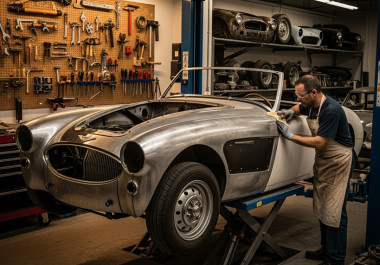It’s a common mistake to think all car auctions are the same mad scramble of fast-talking auctioneers and hopeful bidders. But behind the scenes, there are two very different games being played: the retail auction and the trade auction. Knowing which is which is probably the most important lesson anyone can learn before thinking about raising a hand to bid.
Get it right, and you could drive away with a cracking deal. Get it wrong, and you could end up with a bigger headache than bargained for. It’s a lesson many newcomers learn the hard way. Someone wanders into a trade-only sale looking for a cheap runabout, not realising the cars are all being sold "as seen," with barely a word written down about their condition. They find themselves completely out of their depth, surrounded by seasoned pros speaking a different language, and leave feeling more stressed than excited. It’s a classic rookie error.
Here’s a breakdown of the real difference between a retail sale, meant for the general public, and a trade sale, which is the professional's playground.
Who's in the Room? The Bidders Make the Difference
The biggest clue to the type of auction is the people standing around. You can tell a lot just by watching them.
At a Retail Auction: You’ll find all sorts. Families with kids in tow looking for a second car, nervous new drivers hunting for their first motor, or just enthusiasts having a browse on a Saturday morning. The atmosphere is usually a bit more relaxed, more of an event. Because these buyers need confidence, the descriptions of the cars are much more detailed, pointing out the service history, any known faults, and the general condition. People here are buying a car to solve a problem – they need something reliable for the school run or their daily commute.
At a Trade Auction: This is a different scene altogether. It’s full of dealers, garage owners, and mechanics who buy and sell cars for a living. They’re not looking for a perfect car; they’re looking for profit. They’ll have a quick walk around a car, listen to the engine for thirty seconds, and know exactly what it’s worth and what it needs. They can spot a car that’s a quick fix and an easy flip from a hundred paces. The mood is faster, more serious, and everyone knows the score.
What's for Sale? A Tale of Two Forecourts
The type of vehicle on offer is another dead giveaway. The stock is usually sourced and presented very differently.
Retail Auction Stock: You're more likely to find cars that are ready, or very nearly ready, for the road. Think three-year-old ex-company cars with high mileage but a folder thick with service history, tidy part-exchanges from main dealers, or family estates that have been well looked after. The auction house makes an effort to present these cars well because they know private buyers are put off by big repair jobs. You can find a huge variety of these on the main vehicle auctions listings.
Trade Auction Stock: This is where the rough diamonds are. You’ll find rows of end-of-life fleet vehicles, high-mileage vans that have clearly worked hard for a living, and even salvage cars that need significant repairs. The information provided is often minimal, a note like "engine turns over, no further checks" is common. It’s entirely up to the buyer to assess the work needed. This is where the real bargains are found, but only for those with the skills and nerve to bring them back to life.
The Small Print: Condition Reports and What’s Written Down
This is where the difference really hits home. How a car’s condition is described tells you everything about who the auction is for.
In a retail-focused sale, the condition report is a buyer's best friend. It will often detail any cosmetic damage with a grading system, mention if the electrics are working, and confirm the car drives without any major issues. This level of detail is there to give a private buyer the confidence to bid, especially if they’re doing it online from their living room.
In a trade sale, you’ll be lucky to get more than a couple of lines. The phrase "sold as seen" is king. The assumption is that a professional buyer will do their own checks and knows how to price in the risk of a hidden fault. They don’t need their hand held, and the sparse details reflect that. A trader knows a bit of dashboard wear is nothing to worry about, but a puff of blue smoke on start-up could mean a four-figure engine bill.
The Pace and the Pressure: Two Different Worlds
It’s not just what you’re buying, but how it’s sold. The atmosphere in the hall (or the virtual bidding room) is completely different. A retail auction might move at a more considered pace, with the auctioneer taking time to highlight a car's good points. There's a bit more theatre to it.
A trade auction, on the other hand, can be brutally fast. An auctioneer might get through three or four cars a minute. The bidding is done with nods and subtle gestures. If you hesitate, you’ve missed it. It’s a high-pressure environment built for quick decisions and professionals who have already done their sums before the car even rolls up.
Understanding the Costs: Fees and Final Prices
The way you pay and the final price to expect are also shaped by the type of auction.
Retail auctions tend to have very clear, upfront fees. The buyer's premium and any admin charges are usually laid out plainly so there are no nasty surprises. The final hammer price might be a bit higher because you have private buyers, sometimes bidding with their heart, competing for a clean, ready-to-go car.
Trade auctions can be a bit more complex, sometimes requiring a monthly or annual membership to even get in the door. While the hammer price on a vehicle might look incredibly low, a professional bidder is mentally adding the cost of a new clutch, a set of tyres, or a few hours in the bodyshop to their calculation. They’re bidding on the potential, not the finished article.
So, Which Auction is Right for You?
Choosing the right type of auction is simple once you’re honest about your own skills and what you’re looking for.
If you’re a private buyer looking for a reliable car to get you from A to B, stick to retail auctions. The detailed reports and consumer-friendly approach are designed for you. You’ll find plenty of options, from everyday car auctions to more specialised sales for things like motorhome auctions.
If you’re a mechanic, a dealer, or a serious enthusiast who knows their way around a toolbox, then a trade auction is where the real action is. The risks are higher, but the rewards can be much greater. You can find some serious projects in the van auctions or even look at selling your own stock through a service to auction your car.
Ultimately, both have their place. The key is to know which door you’re walking through before you start bidding. It’s about matching the auction to your own expertise and expectations.




